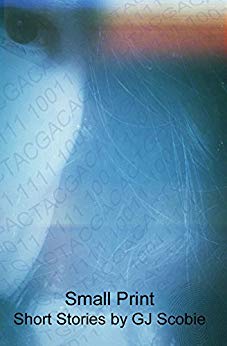 Small Print is a collection of four sci-fi short stories, all premised around the ways in which advanced technology can disrupt the lives of organic life forms.
Small Print is a collection of four sci-fi short stories, all premised around the ways in which advanced technology can disrupt the lives of organic life forms.
In “Data,” a skilled hacker’s curiosity gets the better of him, and he finds out more about his employer’s use of data than he would have liked. In “Juliet,” the subject of an experimental space exploration mission struggles to cope with the loneliness of space. In “Small Print,” a technician on a lunar base encounters a clerical error with severe consequences, and in “Shelley,” a young woman grapples with a mysterious trauma from her childhood.
All the stories are well-written and interesting. I liked “Juliet” the best—it ends with a surprise twist that makes an already powerful story even more poignant. “Shelley” was the weakest in my opinion—which is not to say that it was bad—but I just felt the ending was too abrupt, and the main character’s mother didn’t react to certain developments the way I would have expected her to, based on her earlier behavior.
“Data” was particularly hard-hitting, given how many big governments, corporations, and other large faceless entities have recently become fascinated by “big data,” it’s easy to imagine them abusing it just as they do in this story.
“Small Print” was probably the most complex and layered story in the collection. There’s a lot going on here, much of which I liked. I won’t spoil it, but space ghosts are a thing in this story, and you know that’s going to be a winner with me. However, there were other aspects that were a bit confusing—I had to read the story twice before I fully “got” it. Which isn’t necessarily a bad thing, but I felt like some more fleshing out would have made it better.
I think that’s true of every story in this collection, except maybe “Juliet,” which felt quite complete. They all are promising concepts, but left me wanting more. Which is a very good thing—it’s much better to have a good concept in need of more detail than a weak concept that you try to drag out. I look forward to reading more of Scobie’s work in the future.



I’m still trying to get through Nicky Dryden’s flash stories.
Drayden’s stories are good for when you need a laugh or just some escapism. This book is darker, gives you more to chew on… but not necessarily uplifting.
This is a well crafted review. I like the formatting of laying out the premise of each story, then giving the commentary. A neat and ordered approach which helps the reader judge if the collection of stories would be for them. Synopsis followed by review, then onto the next synopsis etc can drag the reader down a bit in trying to judge the collection overall
Thanks for letting me know. That’s very helpful.
Keep on keeping on 👍
I’m not really into short stories, but I might give this lot a try. 🙂
I suspect you would enjoy it. I hope so, anyway. 🙂
I think we’ll all be doing a lot of reading in the coming weeks. 🙂